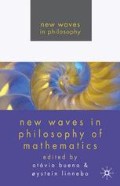Abstract
Much recent work in the philosophy of mathematics has been concerned with indefinite extensibility and the problem of absolute generality. It is not uncommon to take the set-theoretic paradoxes to illustrate a phenomenon of indefinite extensibility whereby certain concepts, for example, set and ordinal, are indefinitely extensible. What is less clear is how to articulate this response to paradox or what it means for the prospects of absolute generality. While some philosophers take the indefinite extensibility of certain concepts to imply the unavailability of unrestricted quantification over their instances, others seem inclined to conclude that there is no comprehensive domain.1 These conclusions are importantly different: One seems to place a serious limitation on thought and language while the other might seem a subtle ontological discovery.
Access this chapter
Tax calculation will be finalised at checkout
Purchases are for personal use only
Preview
Unable to display preview. Download preview PDF.
References
Benacerraf, P., and H. Putnam, eds. (1983) Philosophy of Mathematics, Cambridge University Press, Cambridge, second edition.
Boolos, G. (1984) “To Be Is to Be a Value of a Variable (or to be Some Values of Some Variables),” The Journal of Philosophy 81, 430–449. Reprinted in Boolos (1998).
Boolos, G. (1993) “Whence the Contradiction?” Aristotelian Society, Supplementary Volume 67, 213–233. Reprinted in Boolos (1998), 220–236.
Boolos, G. (1998) Logic, Logic and Logic, Harvard, Cambridge, Massachusetts.
Burgess, J. (2004a) “E Pluribus Unum: Plural Logic and Set Theory,” Philosophia Mathematica (3) 12, 13–221.
Burgess, J. (2004b) “Mathematics and Bleak House,” Philosophia Mathematica (3) 12, 18–36.
Burgess, J. (2005a) “Being Explained Away,” Harvard Review of Philosophy 13, 41–56.
Burgess, J. (2005b) FixingFrege, Princeton University Press, Princeton NJ.
Burgess, J., and G. Rosen (1997) A Subject With No Object, Oxford University Press, New York.
Carnap, R. (1950) “Empiricism, Semantics and Ontology,” Analysis 4, 20–40. Reprinted in P. Benacerraf and H. Putnam (1983), 241–257.
Cartwright, R. (1994) “Speaking of Everything,” Noûs 28, 1–20.
Dummett, M. (1991) Frege: Philosophy of Mathematics, Harvard University Press, Cambridge, MA.
Ferreira, F., and K. Wehmeier (2002) “On the Consistency of the Δ1/1-CA Fragment of Frege’s Grundgesetze,” Journal of Philosophical Logic 31, 301–311.
Fine, K. (2006) “Relatively Unrestricted Quantification,” in A. Rayo and G. Uzquiano, eds., Absolute Generality, Oxford University Press, Oxford, 20–44.
Glanzberg, M. (2004) “Quantification and Realism,” Philosophy and Phenomenological Research 69, 541–572.
Glanzberg, M. (2006) “Context and Unrestricted Quantification,” in A. Rayo and G. Uzquiano, eds., Absolute Generality, Oxford University Press, Oxford, 45–74.
Heck, R. (1996) “The Consistency of Predicative Fragments of Frege’s Grundgesetze der Arithmetik,” History and Philosophy of Logic 17, 209–220.
Hellman, G. (2006) “Against ‘Absolutely Everything’!” in A. Rayo and G. Uzquiano, eds., Absolute Generality, Oxford University Press, Oxford, 75–97.
Hirsch, E. (2002) “Quantifier Variance and Realism,” Philosophical Issues 12, 51–73.
Jech, T. J., ed. (1974) “Axiomatic Set Theory, Part II,” of Proceedings of the Symposia in Pure Mathematics, Volume 13, American Mathematical Society, Providence, R.I.
Jech, T. J. (2006) Set Theory, Springer, 3rd edition Springer-Verlag, Berlin.
Kanamori, A. (2003) The Higher Infinite: Large Cardinals in Set Theory from their Beginnings, Springer.
Koellner, P. (2009) “On Reflection Principles,” Annals of Pure and Applied Logic 157, 206–219.
Linnebo, O. (2007) “Burgess on Plural Logic and Set Theory,” Philosophia Mathematica (3) 15:1, 79–93.
Linnebo, O. (2008) “Pluralities and Sets,” presented at a Workshop in Philosophical Logic in Oxford, March 2008 Unpublished typescript.
Montague, R. (1961) “Semantic Closure and Non-Finite Axiomatizability I,” in Infinitistic Methods: Proceedings of the Symposium on the Foundations of Mathematics (Warsaw 1959), New York, Pergamon, 45–69.
Parsons, C. (2006) “The Problem of Absolute Universality,” in A. Rayo and G. Uzquiano, eds., Absolute Generality, Oxford University Press, Oxford, 203–219].
Parsons, T. (1987) “On the Consistency of the First-Order Portion Frege’s Logical System,” Notre Dame Journal of Formal Logic 28, 161–168.
Putnam, H. (1994) “The Question of Realism,” in J. Conant, ed., Words and Life, Harvard University Press, Cambridge MA.
Putnam, H. (2004) Ethics Without Ontology, Harvard University Press, Cambridge MA.
Quine, W. V. (1948) “On What There Is,” Review of Metaphysics 2, 21–38. Reprinted in Willard V. Quine, From a Logical Point of View.
Quine, W. V. (1980) From a Logical Point of View, Harvard University Press, Cambridge MA.
Rayo, A., and G. Uzquiano, eds. (2006) Absolute Generality, Oxford University Press, Oxford.
Reinhardt, W. (1974) “Remarks on Reflection Principles, Large Cardinals, and Elementary Embeddings,” in T. J. Jech (1974).
Schroeder-Heister, P. (1987) “A Model-Theoretic Reconstruction of Frege’s Permutation Argument,” Notre Dame Journal of Formal Logic 28:1, 69–79.
Shapiro, S. (1987) “Principles of Reflection and Second-Order Logic,” Journal of Philosophical Logic 16, 309–333.
Stalnaker, R. C. (2003) Ways a World Might Be: Metaphysical and Anti-Metaphysical Essays, Clarendon Press, Oxford.
Tait, W. (2005) “Constructing Cardinals from Below,” in W. Tait, ed., The Provenance of Pure Reason: Essays in the Philosophy of Mathematics and Its History, Oxford University Press, Oxford.
Uzquiano, G. (1999) “Models of Second-Order Zermelo Set Theory,” Bulletin of Symbolic Logic 5:3, 289–302.
Uzquiano, G. (2003) “Plural Quantification and Classes,” Philosophia Mathematica 3, 67–81.
Yablo, S. (2006) “Circularity and Paradox,” in T. Bolander, ed., Self-Reference,CSLI Publications, Stanford CA.
Zermelo, E. (1930) “Über Grenzzahlen und Mengenbereiche: Neue Untersuchungen iiber die Grundlagen der Mengenlehre,” Fundamenta Mathematicae 16, 29–47.
Author information
Authors and Affiliations
Editor information
Editors and Affiliations
Copyright information
© 2009 Gabriel Uzquiano
About this chapter
Cite this chapter
Uzquiano, G. (2009). Quantification Without a Domain. In: Bueno, O., Linnebo, Ø. (eds) New Waves in Philosophy of Mathematics. New Waves in Philosophy. Palgrave Macmillan, London. https://doi.org/10.1057/9780230245198_14
Download citation
DOI: https://doi.org/10.1057/9780230245198_14
Publisher Name: Palgrave Macmillan, London
Print ISBN: 978-0-230-21943-4
Online ISBN: 978-0-230-24519-8
eBook Packages: Palgrave Religion & Philosophy CollectionPhilosophy and Religion (R0)

